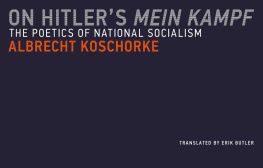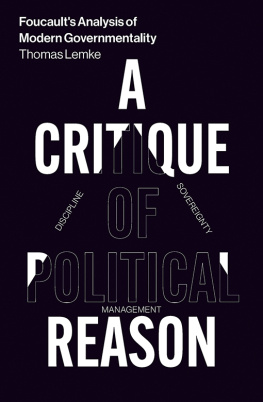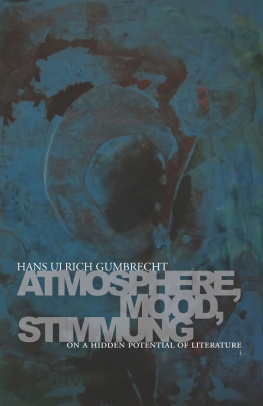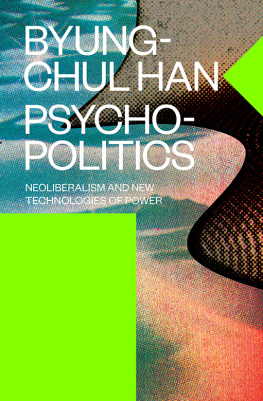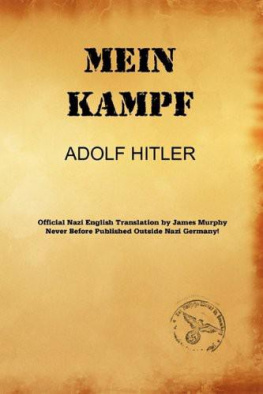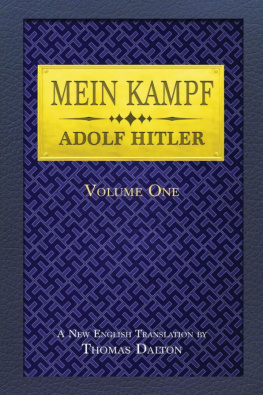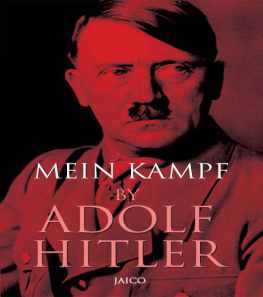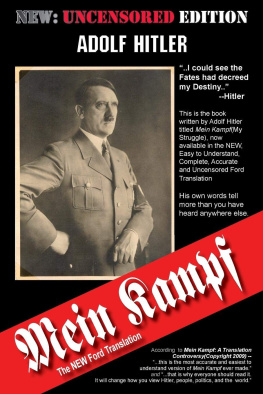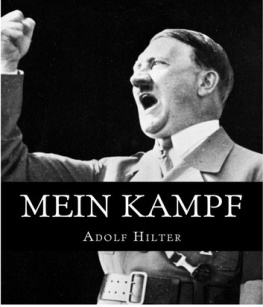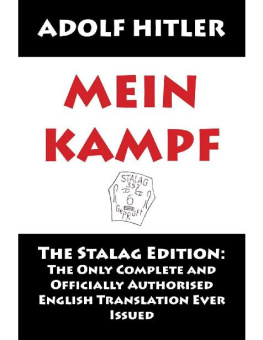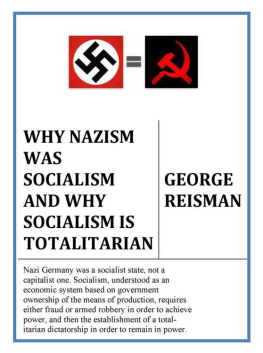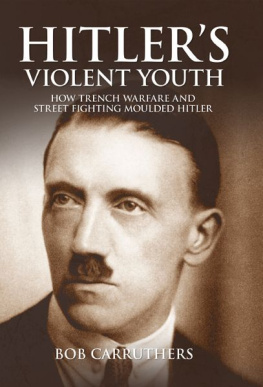Butler Erik - On Hitlers Mein kampf: the poetics of National Socialism
Here you can read online Butler Erik - On Hitlers Mein kampf: the poetics of National Socialism full text of the book (entire story) in english for free. Download pdf and epub, get meaning, cover and reviews about this ebook. City: Germany, year: 2017, publisher: The MIT Press., genre: Politics. Description of the work, (preface) as well as reviews are available. Best literature library LitArk.com created for fans of good reading and offers a wide selection of genres:
Romance novel
Science fiction
Adventure
Detective
Science
History
Home and family
Prose
Art
Politics
Computer
Non-fiction
Religion
Business
Children
Humor
Choose a favorite category and find really read worthwhile books. Enjoy immersion in the world of imagination, feel the emotions of the characters or learn something new for yourself, make an fascinating discovery.
- Book:On Hitlers Mein kampf: the poetics of National Socialism
- Author:
- Publisher:The MIT Press.
- Genre:
- Year:2017
- City:Germany
- Rating:5 / 5
- Favourites:Add to favourites
- Your mark:
- 100
- 1
- 2
- 3
- 4
- 5
On Hitlers Mein kampf: the poetics of National Socialism: summary, description and annotation
We offer to read an annotation, description, summary or preface (depends on what the author of the book "On Hitlers Mein kampf: the poetics of National Socialism" wrote himself). If you haven't found the necessary information about the book — write in the comments, we will try to find it.
Butler Erik: author's other books
Who wrote On Hitlers Mein kampf: the poetics of National Socialism? Find out the surname, the name of the author of the book and a list of all author's works by series.
On Hitlers Mein kampf: the poetics of National Socialism — read online for free the complete book (whole text) full work
Below is the text of the book, divided by pages. System saving the place of the last page read, allows you to conveniently read the book "On Hitlers Mein kampf: the poetics of National Socialism" online for free, without having to search again every time where you left off. Put a bookmark, and you can go to the page where you finished reading at any time.
Font size:
Interval:
Bookmark:

Untimely Meditations
1.The Agony of Eros
Byung-Chul Han
2.On Hitlers Mein Kampf: The Poetics of National Socialism
Albrecht Koschorke
3.In the Swarm: Digital Prospects
Byung-Chul Han
4.TheTerror of Evidence
Marcus Steinweg
Albrecht Koschorke
Translated by Erik Butler
The MIT Press
Cambridge, Massachusetts
London, England
2017 Massachusetts Institute of Technology
Originally published as Adolf Hitlers Mein Kampf: Zur Poetik des Nationalsozialismus in the series Frhliche Wissenschaft by Matthes & Seitz Berlin: Matthes & Seitz Berlin Verlagsgesellschaft mbH, Berlin 2016. All rights reserved.

The translation of this work was supported by a grant from the Goethe-Institut which is funded by the German Ministry of Foreign Affairs.
All rights reserved. No part of this book may be reproduced in any form by any electronic or mechanical means (including photocopying, recording, or information storage and retrieval) without permission in writing from the publisher.
This book was set in PF Din Text Pro by Toppan Best-set Premedia Limited. Printed and bound in the United States of America.
Library of Congress Cataloging-in-Publication Data
Names: Koschorke, Albrecht, 1958- author. | Butler, Erik, 1971- translator.
Title: On Hitlers Mein kampf : the poetics of National Socialism / Albrecht Koschorke ; translated by Erik Butler.
Other titles: Adolf Hitlers Mein Kampf. English
Description: Cambridge, MA : The MIT Press, 2017. | Series: Untimely meditations | Includes bibliographical references and index.
Identifiers: LCCN 2016028487 | ISBN 9780262533331 (pbk. : alk. paper)
eISBN 9780262338769
Subjects: LCSH: Hitler, Adolf, 18891945. Mein Kampf. | Hitler, Adolf, 18891945--Philosophy. | National socialism--Philosophy. | National socialism--Psychological aspects. | Germany--Politics and government--20th century.
Classification: LCC DD247.H5 K66513 2017 | DDC 943.086092--dc23 LC record available at https://lccn.loc.gov/2016028487
ePub Version 1.0
Approaching the phenomenon of Adolf Hitler calls for broadening the scope of inquiry, not demonizing an individual. This measure is advisable if only because anyone can concoct a muddled combination of social critique and political mythology. Fortunately, very few manage to muster a powerful party in this way, much less win an entire people over to their cause. This sort of success can occur only under specific conditions. Analyzing these conditionswhich is becoming more urgent in our own times of mounting radicalizationbroaches the questions of how social myths (in the broadest sense) first emerge and what roles journalism and public discourse play in this process. How do the stories and histories that societies tell themselves about their past and their future arise? What images of collective being and self-diagnoses of conditions prevail in long-term social communication, both in everyday life and in public exchanges? How is it that certain ideasespecially ones that start out as marginal and circulate on a small scalestrike a chord with the population at large, and under what circumstances do they make the leap from the world of speeches and screeds into political action?
It has long been uncontroversial that social conditions are not simply reflected in their cultural representations. The connections between being and consciousness are manyand they are contested in many ways. One important reason is that instances of cultural symbolization constitute actions within their symbolic fields. They do not passively register given conditions in the manner of measuring devices; rather, and to varying degrees, they exercise transformative effects on them. In other words, it is not a cold and objective relationship between social facts and their cultural representationbetween object and conceptso much as a hot, circular dynamic. Even by conventional logical standards, this implies an imbalance. By the same token, the semantic heat of reaction depends on the social energy expended. This energy takes shape in varied affective states anywhere along the spectrum of emotional investment extending from desire to hatred.
Stressing the performative quality of communication sheds light on the historical individuals, as well as authorities and institutions, that are responsible for ensuring that certain social self-representations achieve influence. It is scarcely possible to ascribe such a steering function only to the self-actualization of discourses. Their capacity to prevail depends on actors assuming positions within the cultural field. In order to propagate and achieve hegemonic validity, ideas rely on a substratealong with whatever communicative infrastructure stands at the ready. Accordingly, inasmuch as the fabrication of social self-descriptions consists of creative actsthat is, performative actions on the part of individual or institutional agentsit is necessary to introduce a third dimension to the dichotomy between facts and ideas, social givens and cultural semantics. This function is exercised by parties who manage to lend form to an amorphous mass of facts, tendencies, and speculations and stamp them with a mode of description that finds recognition in ever-greater circles, until, finally, that mass becomes the official self-image of a society. It proves especially significant in phases of social upheaval, when a high degree of timeliness and topicalityevident in increasing readiness for violencecombines with an equally pronounced degree of inarticulacy, if not disorientation.
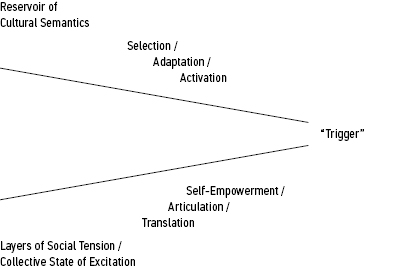
As a rule, states of social tension that lead to radical upheavals arise from an extremely complicated web of factors, which the people involved can comprehend only in part. In consequence, any account of the overall situation displays a high degree of arbitrariness, especially if meant to prove digestible in communicative terms and produce results on a broad scale. An effective description helps to articulate inarticulate experience by translating more or less diffuse emotional statesfear, hatred, feelings of belonging, desires, interests, and so oninto slogans and narratives that admit strong affective charges. In the process, it creates cognitive stabilization where none existed before, facilitating distinctions between friend and foe, us and them. That is why a tertiary entity, which bridges collective agitation and a preexisting ideational edifice (or one adapted to the purposes at hand), often plays the role of a trigger, catalyzing a social explosion. Either the trigger points to a target for pent-up aggression, or it unites free-floating expectations, hopes, and desires to focus coordinated efforts of renewal. That said, these two strategies cannot be neatly separated from each other; they occur in hybrid forms without number.
Conventionally, the trigger figure is characterized as the great man and the crowd. Political historiography from the times of Livy up to the revolutions of the twentieth century features exemplary individuals of this stripe, the leader of the angry masses. With due reverence, literature and operabut especially history painting and filmhave also provided the stage for such personages to take the spotlight. Sociology has done so, too. A model treatment is Gustave Le Bons
Next pageFont size:
Interval:
Bookmark:
Similar books «On Hitlers Mein kampf: the poetics of National Socialism»
Look at similar books to On Hitlers Mein kampf: the poetics of National Socialism. We have selected literature similar in name and meaning in the hope of providing readers with more options to find new, interesting, not yet read works.
Discussion, reviews of the book On Hitlers Mein kampf: the poetics of National Socialism and just readers' own opinions. Leave your comments, write what you think about the work, its meaning or the main characters. Specify what exactly you liked and what you didn't like, and why you think so.

